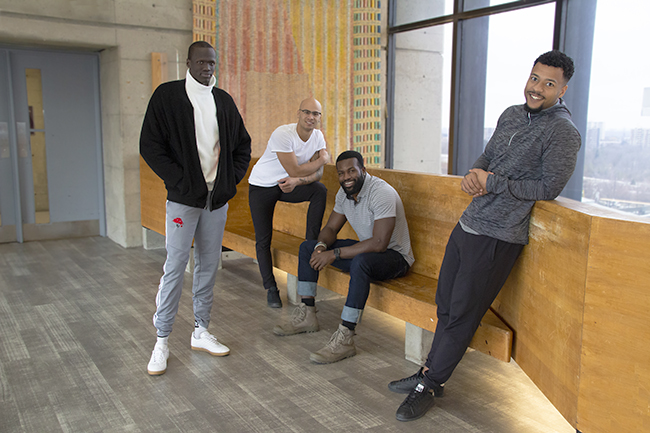For children and adolescents across Canada, organized sports provide an avenue to build lasting connections, develop social skills, lead healthy lives, and realize potential at an early age. However, due to financial barriers, these opportunities can be difficult for some families to afford. With today’s cost of living on the rise, disposable income required for extra-curricular activities has become tougher to come by. As a result of these challenges, sport participation among youth is on the decline.
From the standpoint of Faculty of Liberal Arts & Professional Studies (LA&PS) student athletes Jacob Janke, Rossini Sandjong, Gaetano Minto and Daniel Loggale, something needs to be done to counter this trend. Taking the field together with the 2019-20 York Lions football team, this group is unified behind a singular cause – one that aims to overcome these economic obstacles.

These friends, who’ve all relocated from their home provinces to pursue a university education at York, acknowledge the common factor that brought them together. It isn’t difficult to imagine how things could have gone differently if not for organized sports being introduced to them many years ago.
“We were all sitting around, and the conversation was about how four people from different parts of the country became best friends,” Janke said. “It was football. The common theme was that someone gave each of us a shot along the way. We all came from situations where we wouldn’t have been able to play organized sports if someone – whether it was a role model or mentor – didn’t provide support and guide us along that path.”
Now enrolled in the final year of their studies at York University, this group is dedicated to facilitating similar opportunities for others who may need assistance. This pledge to give back to the community is what led to the creation of their non-profit organization, Tiny Strides.
Tiny Strides came together after countless discussions on the subject, as the group worked together to brainstorm fundraising methods to support participation in sports among underprivileged youth. As the name implies, the group agreed that a small-scale approach would lead to notable results. Even if their efforts would only impact one individual, it would have been worth it. After submitting paperwork to become a registered non-profit last year, this initiative became official.
The goal was closely aligned to their upbringing as minorities with additional barriers to overcome. In the past, being empowered through sport wasn’t always a reality for these LA&PS students. Today, football has become a regular aspect of everyday life. Now, the group aspires to encourage sport participation and exemplify the ways in which these activities can serve as catalysts for positive outcomes on and off the field.
“One really great thing about sport is that it brings out family,” Minto said “With Tiny Strides, we can play a part in creating those families, those spaces for individuals. It’s more than a game if you use it the right way.”
Through pub nights, event appearances, and 50-50 charity raffles, the group has been able to raise thousands of dollars to cover the costs of equipment and sport registration fees. However, the mentorship aspect of the initiative cannot be overstated. In just one year, they’ve built meaningful connections with minor league football programs, as well as nearby community shelters.
“Last July, we were approach by a refugee shelter not too far from campus,” Sandjong said. “There were kids from different parts of the world who had been living there for a couple months. We had the chance to introduce sports to their lives. There were three days of programming. On the first day, we introduced them to football. On the second day, we played soccer. Then, on the third day, we brought them to Canada’s Wonderland.”
The strong bonds formed by Tiny Strides have played a significant role in some of these children continuing to play football, several months after the shelter visit. Each of the non-profit’s founders are extremely proud of how their efforts have resonated thus far.
This year, the group hopes to continue taking small steps in establishing similar ties with local youth and sport organizations while still raising funds for those in need. The eventual goal is for these relationships to be facilitated with an integrated mentorship program more closely linked to York University Lions football.
“As members of the black community, we’re often seen as the people trying to tear each other down. It feels great to break that stereotype,” Loggale said. “We’re not just conforming to what people think we should be doing. We’re stepping out of that box that they put us in. We want to uplift.”
“If you look at where York is positioned geographically, sometimes it seems that we shy away from the Jane & Finch community,” Janke added. “The university can be that uplifting force. I think that’s something we should start to embrace.”
Originally published in YFile.
Written by Andre McLean
